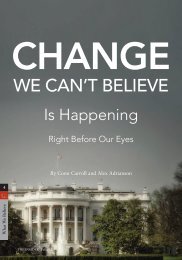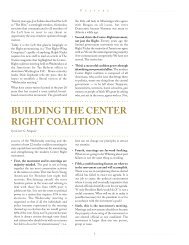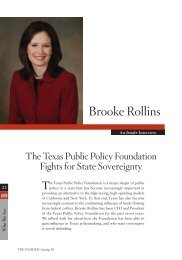Federalism: Statement of Principles [PDF] - InsiderOnline.org
Federalism: Statement of Principles [PDF] - InsiderOnline.org
Federalism: Statement of Principles [PDF] - InsiderOnline.org
You also want an ePaper? Increase the reach of your titles
YUMPU automatically turns print PDFs into web optimized ePapers that Google loves.
<strong>Federalism</strong><br />
<strong>Statement</strong> <strong>of</strong> <strong>Principles</strong><br />
By Ronald W. Reagan<br />
10<br />
Every now and then, it’s worth revisiting<br />
certain principles <strong>of</strong> good government—like<br />
federalism. A good place to start is with President<br />
Ronald Reagan’s <strong>Statement</strong> <strong>of</strong> <strong>Principles</strong>,<br />
issued on April 8, 1986, and reproduced on the<br />
opposite page. Reagan’s principles are relevant<br />
to many policy problems. One such is education<br />
policy, a current topic <strong>of</strong> national debate.<br />
Discussions <strong>of</strong> education policy typically<br />
focus on things like budgets, testing, accreditation,<br />
and standards. Today policymakers are<br />
considering expanding the federal No Child<br />
Left Behind program so that it encompasses<br />
high school as well as elementary school children.<br />
Further, some are even talking about<br />
NCLB as a model for a higher education testing<br />
regime.<br />
Reagan’s principles direct us to a different<br />
set <strong>of</strong> questions. Is the federal government<br />
uniquely competent to set education policy for<br />
every state? Could state experimentation help<br />
us find better solutions for increasing educational<br />
achievement? Is there really only one<br />
best education policy that fits every state?<br />
At page 12, Eugene Hickok notes that federalizing<br />
education policy threatens to undermine<br />
the important role <strong>of</strong> responsible citizenship. If<br />
the federal government intrudes where state<br />
policy fails, then why should citizens bother<br />
holding their state governments accountable<br />
for performance?<br />
At page 15, Ge<strong>org</strong>e Leef shows that higher<br />
education is plagued, not be a lack <strong>of</strong> government<br />
action, but by overly generous subsidies<br />
from both the states and the federal government.<br />
As we go to press, the U.S. Congress is considering<br />
expanding student loans and creating a<br />
federal testing regime. How are the states to<br />
fix bad policies when the federal government is<br />
moving in exactly the wrong direction? —Ed.<br />
The Insider Winter 07
April 8, 1986<br />
I. <strong>Federalism</strong> is rooted in the knowledge<br />
that our political liberties are best assured<br />
by limiting the size and scope <strong>of</strong> the<br />
national government.<br />
II. The people <strong>of</strong> the States created the<br />
national government when they delegated<br />
to it those enumerated governmental<br />
Xxxxxxx<br />
powers relating to matters<br />
xxxxx<br />
beyond the<br />
competence <strong>of</strong> the individual xxxxxx States.<br />
All other sovereign powers, xxxxxx save those<br />
expressly prohibited the States by the<br />
Constitution, are reserved to the States<br />
or to the people.<br />
III. The constitutional relationship among<br />
sovereign governments, State and national,<br />
is formalized in and protected by the<br />
Tenth Amendment to the Constitution.<br />
IV. The people <strong>of</strong> the States are free, subject<br />
only to restrictions in the Constitution<br />
itself or in constitutionally authorized<br />
Acts <strong>of</strong> Congress, to define the moral,<br />
political, and legal character <strong>of</strong> their lives.<br />
V. In most areas <strong>of</strong> governmental concern,<br />
State and local governments uniquely<br />
possess the constitutional authority, the<br />
resources, and the competence to discern<br />
the sentiments <strong>of</strong> the people and<br />
to govern accordingly. In Jefferson’s<br />
words, the States are “the most competent<br />
administrations for our domestic<br />
concerns and the surest bulwarks<br />
against anti-republican tendencies.”<br />
VI. The nature <strong>of</strong> our constitutional system<br />
encourages a healthy diversity in the public<br />
policies adopted by the people <strong>of</strong> the several<br />
States according to their own conditions,<br />
needs, and desires. In the search for<br />
enlightened public policy, individual States<br />
and communities are free to experiment<br />
with a variety <strong>of</strong> approaches to public issues.<br />
VII. Acts <strong>of</strong> the national government—whether<br />
legislative, executive, or judicial in nature—<br />
that exceed the enumerated powers <strong>of</strong> that<br />
government under the Constitution violate<br />
the principle <strong>of</strong> federalism established by<br />
the Founders.<br />
VIII. Polices <strong>of</strong> the national government should<br />
recognize the responsibility <strong>of</strong>—and should<br />
encourage opportunities for—individuals,<br />
families, neighborhoods, local governments<br />
and private associations to achieve<br />
their personal, social, and economic objectives<br />
through cooperative effort.<br />
IX. In the absence <strong>of</strong> clear constitutional or<br />
statutory authority, the presumption <strong>of</strong><br />
sovereignty should rest with the individual<br />
States. Uncertainties regarding<br />
the legitimate authority <strong>of</strong> the national<br />
government should be resolved against<br />
regulation at the national level.<br />
X. These principles should guide the departments<br />
and agencies <strong>of</strong> the national<br />
government in the formulation and implementation<br />
<strong>of</strong> policies and regulations.<br />
11<br />
Visit insideronline.<strong>org</strong>


![Federalism: Statement of Principles [PDF] - InsiderOnline.org](https://img.yumpu.com/21889681/1/500x640/federalism-statement-of-principles-pdf-insideronlineorg.jpg)







![Roads to Serfdom [PDF] - InsiderOnline.org](https://img.yumpu.com/23433549/1/182x260/roads-to-serfdom-pdf-insideronlineorg.jpg?quality=85)